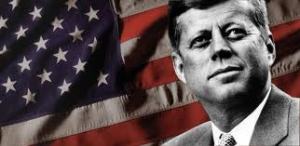 John Fitzgerald Kennedy, 35th President of the United States of America, was assassinated in Dallas, Texas, fifty-one years ago today.
John Fitzgerald Kennedy, 35th President of the United States of America, was assassinated in Dallas, Texas, fifty-one years ago today.
JFK’s murder on November 22, 1963, might be the most significant, singular event that shaped modern history. Ever wonder how our world would be today if Lee Harvey Oswald didn’t pull his trigger and President Kennedy survived?
It’ll never be known, but here’s 5 things where history would probably read different.
1. 1964 Presidential Election
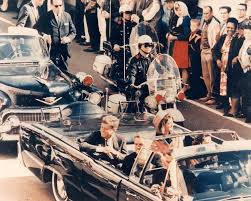 Kennedy’s main reason for his trip to Texas in November, 1963, was to restore unity in the local Democrats. JFK critically needed their support to capture the Texas Electoral College votes. That was the tipping point which narrowly gave him the 1960 election victory over Richard Nixon. The margin was .17 percent.
Kennedy’s main reason for his trip to Texas in November, 1963, was to restore unity in the local Democrats. JFK critically needed their support to capture the Texas Electoral College votes. That was the tipping point which narrowly gave him the 1960 election victory over Richard Nixon. The margin was .17 percent.
The November, 1964, presidential election was going to be a race between Democratic incumbent Jack Kennedy and Republican Party’s Senator Barry Goldwater. JFK committed to winning a second term and the polls prior to his death looked promising.
His popularity rating was at 58 percent right before the assassination and he’d just completed 1,000 days in office. That number was higher than similar ratings for Richard Nixon, Ronald Reagan, Bill Clinton, George W. Bush, and Barack Obama – five presidents who won re-election bids.
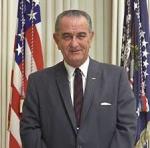 JFK was going to keep Vice President Lyndon Johnson on the ticket as his running-mate. Although Kennedy personally disliked Johnson and cut him out of most decisions, he needed Johnson’s support to carry Texas – Johnson being a powerhouse within Texan Democrats.
JFK was going to keep Vice President Lyndon Johnson on the ticket as his running-mate. Although Kennedy personally disliked Johnson and cut him out of most decisions, he needed Johnson’s support to carry Texas – Johnson being a powerhouse within Texan Democrats.
If JFK had won the 1964 election, Johnson was still likely to become President. I say ‘still likely’ because Kennedy was a sick man. His deteriorating spine caused him immense pain and his advancing Addison ’s disease, the failure of adrenal glands, required him to be severely medicated. It’s unlikely that his health would have stood another five years, thereby defaulting the presidency to Lyndon Johnson sometime in his second term.
There’s no doubt that the shock of JFK’s assassination gave otherwise unearned support to Johnson who pledged to carry out Kennedy’s policies which included civil rights, the space program, nuclear de-escalation in the Cold War, and slowing the spread of communism.
2. Civil Rights
On recordings made in the White House just before his death, President Kennedy told advisers that he expected a tough re-election campaign because of his support of civil rights.
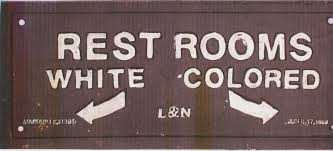 JFK introduced the Civil Rights Act in June, 1963. It faced fierce opposition in Congress, mostly from southern Democrats. Kennedy rejected an attempt to substitute a bill that would allow segregation at public facilities to continue, but it was stalled in Congress when Kennedy died.
JFK introduced the Civil Rights Act in June, 1963. It faced fierce opposition in Congress, mostly from southern Democrats. Kennedy rejected an attempt to substitute a bill that would allow segregation at public facilities to continue, but it was stalled in Congress when Kennedy died.
After JFK’s death, President Johnson told the nation that passing the Civil Rights Act would be the best way to honor Kennedy’s legacy. By July, 1964, Johnson and his allies got the act approved. If Kennedy had lived, the debate over the Civil Rights Act would never have occurred during an election year.
Kennedy would have waited until after the 1964 election with the hope of having more leverage in Congress to pass the act. The combination of Kennedy and Johnson’s commitment to civil rights would still have been a huge, uphill battle and, without JFK’s assassination, probably wouldn’t have succeeded.
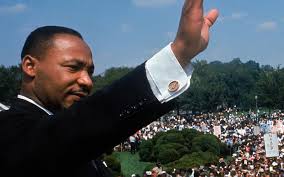 History records that once Johnson became president he was able to get the Civil Rights Act passed in 1964 and Voting Rights Act passed in 1965 using his mandate from a sympathetic landslide election, Kennedy’s legacy, and his considerable powers of persuasion in Congress.
History records that once Johnson became president he was able to get the Civil Rights Act passed in 1964 and Voting Rights Act passed in 1965 using his mandate from a sympathetic landslide election, Kennedy’s legacy, and his considerable powers of persuasion in Congress.
Without question, JFK’s assassination accelerated the implementation of American civil rights which reverberated around the world.
3. Space Program
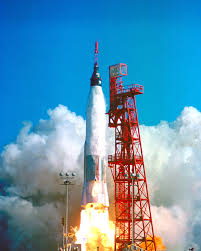 On May 25, 1961, President Kennedy stood before Congress to deliver a special message on “urgent national needs.” He asked for an additional $7 billion to $9 billion over the next five years for the space program, stating to Congress “This nation should commit itself to achieving the goal, before the decade is out, of landing a man on the moon and returning him safely to the earth.”
On May 25, 1961, President Kennedy stood before Congress to deliver a special message on “urgent national needs.” He asked for an additional $7 billion to $9 billion over the next five years for the space program, stating to Congress “This nation should commit itself to achieving the goal, before the decade is out, of landing a man on the moon and returning him safely to the earth.”
Skeptics doubted the National Aeronautics and Space Administration (NASA) ability to meet the president’s ambitious timetable. Within a year, Alan Shepard and Gus Grissom travelled into space.
In February, 1962, John Glenn orbited earth. His success inspired a great army of people who worked to reach the moon. By May, 1963, Scott Carpenter, Walter Schirra, and Gordon Cooper made multiple orbits. Each mission lasted longer than the one before and gathered more data.
As space exploration continued through the 1960s, JFK’s shoot for the moon vision was fulfilled.
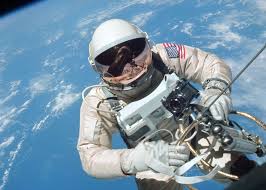 Gemini was the second NASA spaceflight program. Its goals were to perfect the entry and re-entry maneuvers of a spacecraft and conduct further tests on how individuals are affected by long periods of space travel. The Apollo Program followed Project Gemini. It was to land humans on the moon and assure safe return to Earth.
Gemini was the second NASA spaceflight program. Its goals were to perfect the entry and re-entry maneuvers of a spacecraft and conduct further tests on how individuals are affected by long periods of space travel. The Apollo Program followed Project Gemini. It was to land humans on the moon and assure safe return to Earth.
On July 20, 1969, Apollo 11 astronauts—Neil Armstrong, Michael Collins, and Edwin “Buzz” Aldrin realized President Kennedy’s dream.
At 8:18 p.m. ET, Armstrong and Aldrin landed on the moon. Six hours later, Neil Armstrong became the first human to step onto the lunar surface. Both men were returned safely to the earth.
President Kennedy’s vision got the job done on time. His death speeded up our human destiny which is to explore and populate beyond Earth.
4. The Cold War
In October, 1962, the world squeaked-by annihilation when the Soviet Union put nuclear Intercontinental Ballistic Missiles (ICBMs) in Cuba. The Cuban Missile Crisis hit the height of the Cold War and tensions between the Russia and the USA were ready to snap.
Kennedy’s cool, but tough, handling through diplomatic back-door discussions with Soviet Premier Nikita Khrushchev resulted in a Cold War turning point. The Russians backed down and removed the missiles in exchange for the Americans taking their ICBMs out of Turkey.
Khrushchev developed a respect for Kennedy as a man he could trust and deal with.
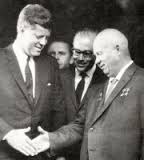 After JFK’s sudden death and Johnson’s immediate succession, the Soviets returned to an aggressive, hard line against America and continued their mistrust of American administrations under Presidents Nixon, Ford, and Carter. It took a quarter century for frosty relations to thaw till Ronald Reagan asked for the Berlin Wall to come down.
After JFK’s sudden death and Johnson’s immediate succession, the Soviets returned to an aggressive, hard line against America and continued their mistrust of American administrations under Presidents Nixon, Ford, and Carter. It took a quarter century for frosty relations to thaw till Ronald Reagan asked for the Berlin Wall to come down.
The Cold War would’ve been warmer and shorter had Jack Kennedy not been cut down in Dallas.
5. Vietnam
Audio tapes from November 19, 1963, show Jack Kennedy’s take on Vietnam as he quizzed two aides who’d returned from South-East Asia.
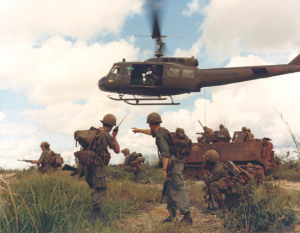 “On the one hand, you get the military saying the war is going better, and on the other hand, you get the political opinion with its deterioration. I’d like to have an explanation what the reason is for the difference,” Kennedy asked.
“On the one hand, you get the military saying the war is going better, and on the other hand, you get the political opinion with its deterioration. I’d like to have an explanation what the reason is for the difference,” Kennedy asked.
“He had a strong, overwhelming reason for being in Vietnam and that we should support the war in Vietnam, but not get our soldiers involved in combat,” Robert Kennedy said about his brother. The reason was the Domino theory. “It’ll be the loss of all of Southeast Asia if you lost Vietnam. I think everybody was quite clear that the rest of Southeast Asia would fall and this is the quandary he wrestled with.”
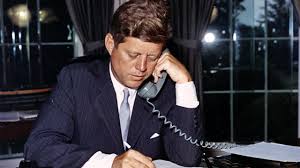 But, three weeks before President Kennedy’s death, South Vietnamese president Ngo Dinh Diem was killed in a military coup indirectly supported by the United States. Kennedy then made it his priority to stabilize the region by assisting with military material and advisers, but he was loath to putting American army boots on the ground.
But, three weeks before President Kennedy’s death, South Vietnamese president Ngo Dinh Diem was killed in a military coup indirectly supported by the United States. Kennedy then made it his priority to stabilize the region by assisting with military material and advisers, but he was loath to putting American army boots on the ground.
The Vietnam situation rapidly deteriorated in the year after JFK’s death. In August, 1964, Congress (with President Johnson’s forceful manipulation) approved the Gulf of Tonkin Resolution. It gave Johnson the ability to commit massive amounts of U.S. troops without a war declaration.
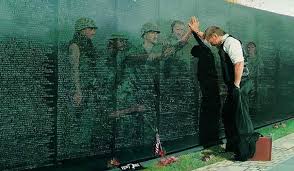 In 2009, Koji Masutani made a film about President Kennedy and Vietnam in Virtual JFK: Vietnam If Kennedy Had Lived. It was based on research of data and transcripts from the Kennedy administration. Masutani and the researchers concluded that Kennedy would have sought a more diplomatic solution than Johnson.
In 2009, Koji Masutani made a film about President Kennedy and Vietnam in Virtual JFK: Vietnam If Kennedy Had Lived. It was based on research of data and transcripts from the Kennedy administration. Masutani and the researchers concluded that Kennedy would have sought a more diplomatic solution than Johnson.
Their theory was that Kennedy’s pattern of behaviour was established in his handling of crises like the Bay of Pigs and Cuban Missile situations. It saw the president going against the advice of his military advisers to find a diplomatic solution. Kennedy’s pre-presidential book Profiles In Courage also gave insight into his preference to diplomacy vs. aggression.
De-classified planning documents from November 20, 1963, (2 days before JFK was shot) verify that Kennedy wanted all military personnel out of Vietnam by the end of 1965, unless there were “justified” exceptions. The fallout from the Diem coup was unknown at the time of the Kennedy assassination, so how the he’d have handled Vietnam during an election year will never be known.

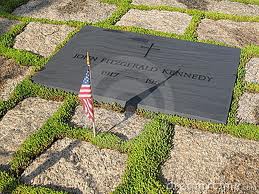
Great posts (as well, of course, as the original one)! Just got done watching ‘11.22.63’ on Hulu based on the Stephen King book. Entertaining, but just fiction. Still begs to make you wonder what could have happened if.
I strongly agree, as most others seem to do, that Vietnam would have simply gone down as just a conflict (no real escalation, many upon many upon many on both sides being spared to this day). Less of a young counter-culture movement had it not taken place but, yes, there may have still been an uphill battle with Civil Rights. There still would have been riots. Sure enough Nixon would have still ran in ’68.
However, it was Vietnam that fed even more to the Civil Rights movement with blacks being made to fight in the war and here, at home, being mistreated with civil unjust which, in turn, gave whites already against such oppression something else to protest against; both issues fed each other thus making the very decade what it’s looked back upon as being. Sure enough Cassius scares white America with the name change, but with no draft to dodge (sacrificing his peak-years/ENTIRE career if need be) it would have given him one less significant thing to end up adding to his legacy as a black leader.
On a much less-important note, pop-culture-wise, the ’60s may have been less ‘radical’. Snoopy’s friend is all anyone would think of today if you’d say the word, ‘Woodstock’. Likely no real ‘hippie’-culture yet alone a certain cult leader from Cincinnati ever exploiting some from that very culture (is Sharon Tate, among others, still alive today?). The Beatles (whose 2nd LP, but the first one that introduced just about all Americans to them, was ominously released on…Nov 22 1963) would have had less of a ‘canvas’ (lyrically, at least) to work on thus likely watering down their legacy in hindsight. By all means, the same with Dylan.
Would Bobby have still run in ’68 (according to a main character in ‘11.22.63’, he would not have)? If the Vietnam War, and all it’s casualties (dead OR alive), have been averted along with the ’70s economy woes due to JFK surviving 11/22/63, would it have indirectly led to something just as bad, or even worse, later on? We’ll never know for sure.
Thanks for your wonderfully articulated comment – you’re right, we’ll never know for sure!
I’m 61 and I recall the loss of JFK very well. I was only 8, but suddenly America changed overnight.
The fun, hope, and spirit just died out. When Vietnam started it really got bad. I was lucky the draft ended before I finished high school in 74. The 70s was a terrible time of recession and inflation. Kids from the 60s fought and died in the war, kids from my time the 70s had to fight unemployment and inflation.
Both generations got screwed, and Oswald’s actions caused it. America lost much due to the war and economic setbacks of those years. We still need to heal and rebuild our nation. I’ve met many VN vets over the years. I also read over 40 books about the war of every type. I was very lucky not to be drafted. Our guys did a great job. That war damaged our political system badly. I wonder if we will ever recover. JFK had style, grace, intelligence, and offered hope and inspiration to youth. We’ve never had that again.
Great comment, Michael. We’ll never know but I really think the Vietnam war wouldn’t have escalated as badly if JFK remained in charge. Quite the change in style, grace and intelligence between JFK and who is in the oval office today.
I am 62 years old now. I lived through era. We basically had teenagers fighting against one another in Vietnam (Americans and Vietnamese). It was called the “Teenage War”. It was a very difficult time for this country. We lost a lot of good people and good leaders during those tumultuous years. Young people, read up on this decade and you will appreciate your lives more and I hope we never have to have a war like the Vietnam War or World Wars for that matter. I cannot even begin to say everything that happened during that decade (the draft, the protests, the young people who never came back from Vietnam, etc). I have some reel-to-reel tapes one of my cousin’s boyfriend sent to her during actual Vietnam conflicts and you can hear gunfire in the background with bombs. I often wonder where all these people are now that all has been said and done. May they all rest in peace. May the Almighty have them in his bosom safely and resting.
This is a really true & heartfelt comment, Peter. Thank you and I hope it gets widely read. ~Garry
Bobby Kennedy admitted to a friend/photographer during his 1968 presidential campaign that JFK was planning on pulling out of Vietnam after the 1964 election. He didn’t want to do this during his first term in fear of the Republicans pinning him as “soft on communism”, which might’ve dealt a big blow to his upcoming presidential campaign.
Thanks for the comment, Hannah. I’d heard the same thing. I wonder what Bobby would have done if he lived to win the 68 election.